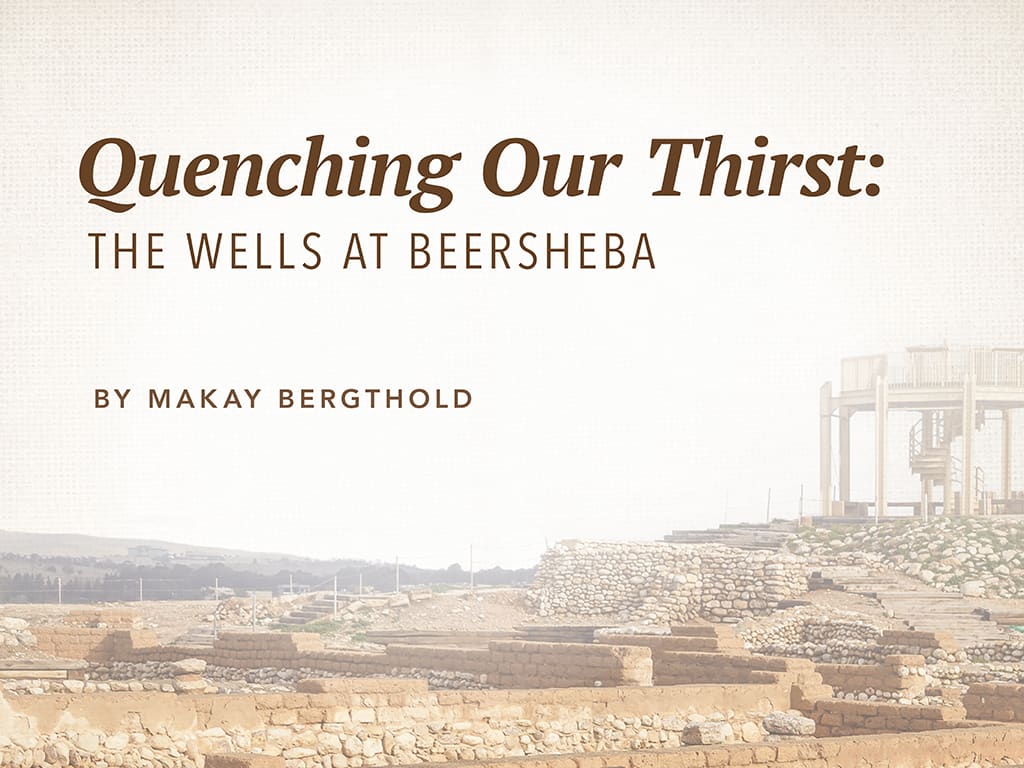Quenching Our Thirst: The Wells at Beersheba

If you’ve ever hiked through a desert landscape, you probably quickly gained an awareness of your dependence on water for survival. Deserts are among our planet’s most inhospitable environments. Without a continual supply of fresh water, survival is impossible. In Genesis 21, we find Abraham dwelling in the Negev Desert in the south of modern Israel. This account demonstrates God’s provision for Abraham in the desert through an oath between Abraham and the Philistine king, Abimelech. The oath secured a peaceful relationship and gave Abraham rights to an abundant water source in the desert: the well of Beersheba.
Archaeologists and scholars have attempted to identify the exact location of Abraham’s well. Two possible sites sit just outside of the modern city of Beersheba. The first is the ancient Tel of Be’er Sheba, spanning 45 acres and rising 65 feet above the surrounding landscape. Though this site bears the name of the well of Abraham, it dates to roughly 800 years after Abraham—the twelfth century BCE. Some scholars conclude that the site corresponds not to Abraham’s well but to the city of Sheba mentioned in Joshua 19:2. Its late date removes the site as a contender for the well of Abraham’s oath, but another site may contain the remains of the well of Genesis 21.
In 1838, Edward Robinson journeyed to Bir es Seba, the Arabic rendering of the Hebrew “Be’er Sheva.” While there, he observed two wells full of abundant, pure water. One of these wells contained an Arabic inscription of the words “Allah” and “Mohammed.” This twelfth-century CE inscription at a site with the correct name may indicate that Muslims recognized this location as the well of Abraham’s oath. All of this suggests a connection to the biblical narrative, but conclusive evidence is unlikely. Abraham and his entourage lived nomadically in tents and did not leave lasting remains that could indicate the well’s association with the biblical account. Though tradition and archaeology cannot provide definitive answers, the well remains a reminder of God’s faithfulness and power to give life to the world. We need water for survival—but more than that, we need Jesus, the light of the world, for the truly abundant life God promises.
While Abraham’s access to the well of Beersheba was vital for the survival of his family and flocks, it also reminded him of God’s covenant faithfulness. Prior to Abraham’s oath at Beersheba, God made a promise (Gen 12:1–3) and a covenant (Gen 15:18–19; 17:1–8) with Abraham. The central features of God’s promise included possession of vast land, numerous descendants, and divine blessing. Remarkably, God’s promise of blessing was not limited to Abraham’s family but overflowed to all humanity. God revealed his intent to reach the ends of the earth, declaring to Abraham that “in you all the families of the earth will be blessed” (Gen 12:3; 22:18). Throughout the Old Testament, we see glimpses of God’s desire for the nations to know him; in Isaiah 49:6, for example, God reaffirms his promise to bless the entire earth through his Servant, one who came as a descendant of Abraham:
Is it too insignificant a task for you to be my servant,
to reestablish the tribes of Jacob,
and restore the remnant of Israel?
I will make you a light to the nations,
so you can bring my deliverance to the remote regions of the earth.
God’s provisions for Abraham in Genesis 21 illuminate his faithfulness toward us. God led Abraham to a well that would allow him to flourish and multiply in the land. Yet God always intended his promise to Abraham to extend beyond Israel, creating a unified people who reflect the glory of his gracious, promised presence forever through the work of his Servant, Jesus.
About the Contributors

Makay Bergthold
Makay is an MBTS student and web content coordinator at DTS. She graduated with a BA in history from the University of Missouri-Kansas City in 2019 and participated in graduate studies at the Hebrew University of Jerusalem before joining DTS. Currently, she and her husband live in Kansas City, MO, and are honored to partner with their local church in furthering the gospel in their community.

